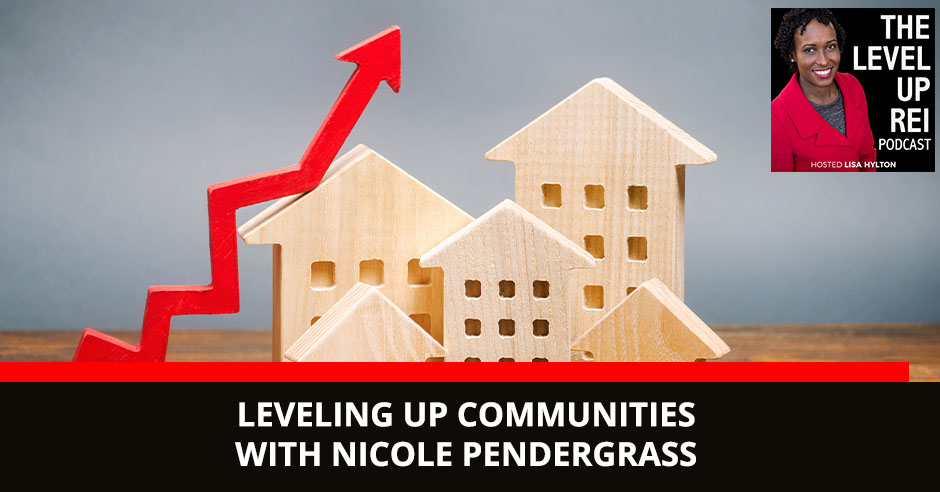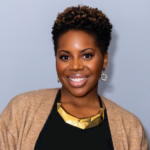
Moving forward towards success is impossible without doing even the smallest steps. If you trust your simplest hustle every single day, nothing can stop you from achieving your goals. Lisa Hylton sits down with Nicole Pendergrass to share her work both as an active and passive real estate investor. Besides talking about her most effective real estate tips, she also emphasizes the right motivation and mindset needed to succeed in this field. Nicole explains the right goal-setting strategy, the importance of embracing the now, and why money must not be the sole driving factor in everything. She also talks about her work at Noirvest Holdings, where she helps minorities find the best opportunities in multifamily investments.
—
Watch the episode here
Listen to the podcast here
Leveling Up Communities With Nicole Pendergrass
I’m super excited to be back with another episode. I have with me, Nicole Pendergrass. Nicole began ravenously consuming real estate investment education in 2010. She is a founding member of two private investment groups focused on wholesaling and out-of-state single-family rentals before branching out on her own and purchasing her first multifamily property in 2015. After a few years of appreciation, she pulled out the equity and invested passively in syndication before acquiring her own multifamily building as a part of a JV.
Nicole is a coordinator for outpatient clinics at a prestigious healthcare facility and has spent her career managing high volume operations, time-sensitive and confidential information. All while remaining a professional and friendly point person between patients, families and the clinical team. Through her combined investment and career experiences, she has developed a knack for details, managing various aspects of operations and customer service. Nicole, I’m happy to have you on the show. How are you doing?
If you don't have a thick skin, active real estate may not be the right place for you. Share on XI’m doing great. Thank you, Lisa, for having me. I’m excited. I appreciate the opportunity.
I’m happy to have you on and the knowledge that you are going to share with my readers, so I’m super excited. To get started and to kick things off, can you share where you are located?
I am in the Bronx, New York City, one of the most expensive markets in the country.
Are you originally from New York?
I’m from South Jersey, so not far. I’m this familiar. I went to school in upstate New York, and then my first job after college was in New York City. All my friends who went to school were from the city area, so I made that transition and it was par for the course.
What do you love to do for fun?

Moving Forward: The most important thing when starting in real estate is knowing who you’re investing with and trying to look into their credibility.
I used to love to travel. I still love to travel but I haven’t been able to do that for a long time. Not COVID-related but more children-related. First, it was me buying my first house and I didn’t have money to travel because I was saving up for that and then it was getting married so I didn’t have money to travel to have a honeymoon and then it was having kids. For a big span of time, I have not been able to travel but that’s something that I definitely like doing when I can.
How many children do you have?
I have two girls.
Real boss lady still and doing all the real estate stuff because we are going to get into your experience. You have been a passive investor and you have also been active, so we are going to talk about both. Giving people an experience of conversations with passive investors, giving your passive real estate investing experience but then also touching on some of your active experience and the lessons that you have learned from that experience as well. Starting with your passive investing experience, can you talk a little bit about how you’ve got started? How did you discover real estate syndications, to begin with?
I don’t know when I first heard about real estate syndication because I have been studying real estate trying to be active on the active side for so long. At some point, I had gone to many multifamily three-day seminars. I don’t remember the first time I heard the word but at least the concept, I was familiar with because of my education on the active side. I’m trying to learn about the real estate investing industry in general.
When you then run across your first syndication deal, how long ago was that?
2019 is when I invested in my first syndication and my only syndication. I have only invested in one passively so far.
What kind of asset class was that investment in?
It’s a B and C type of building, multifamily, in Houston, Texas and 96-unit.
From your experience having done passive investment once, what advice would you give to other passive investors who might be considering passively investing?
Never just wait around for possibilities. You have to think outside the box. Share on XThe most important thing, in the beginning, is knowing who you are investing with and knowing your sponsors, at least trying to look into their credibility. Do the deals make sense? Have you seen that they have done this before? For my situation, I met my operators through a meetup and I was going to the meetup to learn how to do multifamily on the active side. Learning and seeing their website, seeing what they were doing, some deals that had closed and the new opportunities that were coming on, I originally reached out to them to see about tagging along with a deal. Seeing how things are working with a certain program that they were using and implementing for people who wanted to get into it. It transitioned into me being a passive investor in their deal. I get to learn from the passive side what that looks like. I’m always on the go side. It’s good to step back and it feels good to get those distribution checks when I haven’t done anything.
You talked about how you met them at a meetup group initially. As people think about passively investing, they always are typically curious about how they would even run across the opportunity to do so. For you, you weren’t necessarily looking for it but you then met someone at a meetup group. Are there any other ways in which you have seen where people are able to meet?
Before COVID, you could have gone to any real estate associations and you could have gone to meetup groups specifically about multifamily. You are going to find people there. People who want to do multifamily, some people who are new and some people who are active, experienced and have a lot of deals under their belt. It’s getting out there and getting out of your comfort zone to go attend. You need to learn as a passive investor too but then you get to also network and meet the people. As you go multiple times, you will see who the real active, experienced investors are versus the new ones.
Even after COVID, that’s opened up the can of worms because everything’s virtual. You can go to meetups across the country where you couldn’t have gone physically before but now, everyone’s holding their events virtually. Even as things start rolling out to be more in person, there are still going to be a virtual component to a lot of events. A lot of meetups are going to either still have virtual-only or they will have a split model where they will have some people in person and do virtually for the people who are not in the media area and can’t attend in person.
There are so many opportunities in social media, looking at meetups and networking. You just have to look for it. Google multifamily and search on Facebook. Go and find Facebook groups with multifamily groups and join those and see the correspondence. If you see someone corresponding a lot and it seems like they know what they are talking about, private message them, set up a call and then start talking. You don’t even have to necessarily let them know upfront that you are looking to be a passive investor, but get to know them as a person and figure out who they are. As that relationship develops, you can see who you feel comfortable with.
Anything on perhaps a deal structure that you have learnt along the way that could be beneficial to someone who’s thinking about investing? Either preferred return, no preferred return or splits.
That goes to your goals. As an individual investor, you need to know what you are looking to get from the situation as far as returns and what you think will either motivate the sponsor to do more or to do less than what you think is a fair situation. As far as splits, if somebody is a little bit more experienced, they may offer a larger split. It might be closer to a 60/40. It’s because they are more experienced, they are going to want a bigger piece of the pie. Someone who’s less experienced might do a 90/10. They want to give the investors more of that split because they want to prove themselves. Normally, when you are getting a higher return, there are some degree of the higher risk associated with that. You have to know what your level of comfortability is.
Pivoting from that into the active side of the business. Since then, you have done some JV and before that, you were doing some wholesaling at one point and then also having your own multifamilies. Can you talk a little bit about your experience and the desire of how you have even got started in real estate on the active side? When did you know that that was something you wanted to do?

Moving Forward: Go out of your comfort zone and join real estate associations for you to meet real, active, and experienced investors.
That started in 2010 when I went to my first three-day seminar. They know how to sell and they know how to make you so excited. The energy in the room is overwhelming. That first three-day seminar opened up my eyes that real estate investing was not for just the big dogs or the big guys with tons of money and hedge funds and all this stuff. I’m like, “A regular person can get financial freedom through real estate and I don’t have to be some large company?” That is what started the journey. I definitely ran to the back of the room and signed up for that next-level coaching program. From there, I dove headfirst into the education that they were providing and going through all the steps.
As a newbie in real estate where you don’t have money or credit, they always direct you into wholesaling because that’s something you can do simply. The process is simple because you have no money or credit as possible, but it also is hard. They don’t stress how hard wholesaling is. I tried for two years and I never did a deal. I formed a company and we met every week. We put out bandit signs in the middle of the night. We were close and we had something under contract at one point. We did all the things. We had an LLC and we had a business bank account. We had all the stuff that you are supposed to have when you are running a business. We are going to the courthouse, pulling leads and doing direct mail. We hand wrote letters. We did everything and it never turned into a deal.
I don’t know if that was the market that we were in because we weren’t doing Brooklyn and that’s a crazy market. We were doing all these steps where maybe we were doing too many busy work steps and not enough steps that move the needle forward. I always have reflection points as to why that didn’t pan out. There are a lot of things. Maybe we could have had a better mentorship. We were searching at some point but we didn’t find someone who could guide us, especially for market-specific like Brooklyn into the work that was necessary to get those deals done. That’s how I started with real estate.
After joining the REIA because that’s another thing they tell newbies to, “Do join your local REIA.” I was involved with that and a member for a few years. We went on a bunch of different tours around the country. One of those was to Detroit, Michigan and a bunch of us like what was happening there. It was still a distressed city but a lot of development and money was going into the downtown area. We met with professionals there. We drove houses and we have seen a few that were for sale.
Opportunities will not magically fall into your lap. You have to get out there and start making tiny steps every day. Share on XA bunch of us decided to join together and form a group to buy some single-families there, rehab them, rent them, do special needs and start growing from there into buying blocks. We were going to make this whole big conglomerate. That was an experience because Detroit is not for people out of state. If you don’t have someone on the ground there, you don’t know block by block. Detroit has been going up slowly over time but we were too early in that curve, especially for being new to the area. That is a whole other story. I can’t even go into details of what happened to those houses. We dissolved and sold everything at a loss so that’s the wrap-up after four properties.
That then brought you to the first multifamily you did on your own?
At the end of that, I had started looking for property. At first, I was in contract for a condo and then that fell through. I was in the mood of looking for a house so I said, “I’m going to buy something. I’m tired of throwing my money away in rent.” I wanted multifamily the whole time. I did a direct mail campaign to different area codes in the Bronx at 3 and 4 family properties. One of the properties that called me back happened to be turned into the one that I bought, the three-family house in the Bronx.
Do you have that one until now?
Yes, I still have that one. That would open the door to a lot of opportunities for me. It was a struggle at the beginning. I can’t lie and say it was easy. If you don’t have thick skin, I don’t know if real estate is for you on the active side. On the passive side, you can have thin skin because you are not dealing with day-to-day headaches. I had to go through the whole eviction process for a year or two into owning the property. There are a lot of money in rehab and renovation stuff I had to do upfront, even though it was supposed to technically be a move-in-ready property. There are a lot of issues. I can’t even go into everything.
In any case, I lived in one unit and then rented out the other two units, so house hack. Those two units and some parking spaces paid for the mortgage and the water bill. It was supposed to be $300 to $400 extra a month when the tenants were paying. When they weren’t, it was out of my pocket. That was cashflowing. In that time, being in the day-to-day nitty-gritty of managing that property, dealing with all the issues and sinking all my money into it, I didn’t have the mindset, capacity or capital I need to have my own to be able to continue building my portfolio or my holdings. Going out there or still doing that networking that needs to be done and increase my investment career and move that forward.
There are a bunch of life changes because that’s when I’ve got married and had my children during that time. After my first child was a year old, then I started getting a little bit more settled. I had good tenants now and things were moving along. I said, “I need to see what else I can do now to move this needle forward.” That’s when I jumped back into real estate, reading books, going to meetups and being out there. That’s when I met the people who I syndicated with.
Right before I syndicated, I didn’t have the money but what I was also in the process of doing was refinancing the house because the Bronx had appreciated significantly in that timeframe. I pulled money out and I use that capital for a bunch of different things. I invested in the syndication. I put some money into one of those infinite banking, bank on yourself type policies and then I also joined a multifamily education community because I needed a mentorship type of thing. I wanted to have access to the resources and to a group of people who were active, successful and experienced in the multifamily field because I knew that that was the direction that I wanted to go.
You said that thick skin that’s required. A lot of people along the way, when some of those things that didn’t go right happen, would have been like, “Real Estate isn’t for me. I’m out of here.” You still came back and still moving forward. You have launched your company. Can you talk about your company and your vision and focus?
My company is called Noirvest Holdings. It’s the combination of the word Noir, which is French for black, and invest. It’s because I have a deep urge and commitment that I want to help people of color and people who are underserved and overlooked get into multifamily investments and get into the types of deals that we traditionally weren’t able to get into. Even if you want to be active, I will give you my advice. Even if it doesn’t benefit me and my company in raising capital, I would rather be honest with you and tell you what I feel about your situation because maybe you do need to be active.

Moving Forward: There’s so much opportunity in social media for real estate investors. You just need to go there and look them up.
Some people don’t have the time or capacity, or they love their careers, they want to stay there, and they have other family commitments and things that won’t allow them to be active. I also partnered with people on the passive side to bring it into a deal flow, which I’ve also joined a mastermind group. Between the mastermind group and my multifamily education group, many people have a lot of deal flow happening. I know deals are tight but these people are hustling hard and they have deals coming out the wazoo for some reason. Even if it’s not my own deal, if I have to direct capital into someone else’s deal, the main focus is I want to help us get into real estate because I witnessed firsthand how life-changing it could be. I was living check to check. Every week, I knew when my paycheck was coming.
If my coworkers were like, “Did we get paid today?” I would look at them crazy like, “You don’t know when we get paid? How do you not know that?” That was mind-boggling to me. Now, that’s completely transitioned. Since the refi and I’ve got the new valuation on the house, my net worth is no longer negative. My cashflow is better. Sometimes, I forget that we’ve got paid. I look at my account and I’m like, “Why is there so much money in my account?” Not that I’m rolling in the money but I’m like, “We’ve got paid yesterday and I forgot.”
It’s such a blessing to be out of that tight grind kind of situation. I started with three families. It’s something small but it can be completely life-changing. I want to help other people experience that and change their financial futures and change their mindset about what’s possible. That’s where the concept of my business model came in. I’m still building that up. I’m still building up all the details and what the future looks like for the company because it can be a big undertaking. I can have an education arm, passive arm and active mentorship arm. There are all these other things in the work that I want to do and it’s outlining all of those steps out.
Don't be overwhelmed with your work. Just take it one day at a time until you get clarity on what your goals are. Share on XFrom your experience as you look back at your journey up until this point and when you think about the company that you are building now, I feel like it’s inspired by your own journey. Going through the experiences you went through to then get to a place where you now would be able to provide this platform for other people. They look like you and they are at a place in their life where they might not think that it’s possible for them to invest in real estate. Being able to provide the opportunities to get educated to the extent that they want to invest. There are different avenues that they can take passively or actively to do so based on where they are in their life.
I feel so deeply about it because I want to help the people who were me and are me. I know what that feels like to be in that grind and to be living and trying to figure out how you are going to stretch this dollar. I remember I had my studio apartment, which is when you are younger, that’s the symbol of like, “You made it. You are an adult. You have your own place.” They came with my first rental renewal lease and it was $75 higher.
New ownership was in place and I saw certain letters and things they were doing to change and reposition the property. I knew what they were doing because I had taken classes in multifamily before. I said, “I’m looking at them doing this in live–action,” and then the letter came and then I was like, “Crap. This is happening to me.” I already am struggling to find out how I can decrease expenses in New York City, which I don’t know how you can. Getting rid of my $30 cable is not going to make a dent in my lifestyle. The biggest thing you could do is decrease your living expense.
When they sent me the lease with a $75 increase, I said, “$75 in one year? Is that even legal?” I said, “That’s a sign I have to move out.” I moved from having my status symbol place into a roommate situation where it was four of us living in a three-bedroom apartment. I made that sacrifice because I will probably cut my living expenses in half. At that point, I wasn’t planning on buying anything. I didn’t know what I was doing it for. I just knew that I needed to decrease my expenses. A lot of people are not willing to sacrifice their living situation or they don’t want to make a decrease or make any like, “That’s beneath me. I don’t want to do that. I don’t want to live in that area.”
My three-family house is not in the best area. It’s not in a popping neighborhood. It’s in someplace where people were looking at me like, “Why are you buying over there?” They are still renting. You have to get new people around you. You have to change your circle. You have to change the type of information that you are getting from people because that all makes a difference. I was single and I didn’t have kids so I could make some of those sacrifices. I understand everyone says it is different but you have to make some big sacrifices and think of them as short-term. They are not long-term. This is not a forever thing. You are doing it purposefully. It didn’t happen to you. You made that choice. It gives you a little bit more power in the decision-making to know that that’s not forced on you.
Two things that you said right there that are super important. One, the decision that you made to cut down your expenses, life has a way of unlocking other things and opportunities after you make certain commitments and choices. You have to make the commitment and choice first. It shows you some of the other available areas. That’s one of the things that’s extremely powerful going forward. Building a business that is informed by your personal experience along the way, your personal journey and how that has been impacted and be able to give back to other people is key.
The reality is there are a lot of people who do feel that it’s impossible to change the trajectory of their life. Being able to be that beacon of life is super important without a doubt. This then brings me to the reflection section, in which we have mixed a lot of reflections here. What’s your advice for women who are like you, who have a career and they might be continuing to build their professional career and where they are trying to go but they are also interested in investing in real estate? Along the way, you continue to build your career but you are continuing to take risks in investing in real estate. As you look back if you were to talk to your younger self, what would be some of the things you would tell her?

Moving Forward: When you’re getting a higher return, there’s some degree of higher risk associated with that. You just have to know what your level of comfortability is.
I would say to my younger self that there’s always a way. You don’t have to wait. There are possibilities. You have to think outside the box and develop a skill. I’m talking from the active side because I want it to be active. For someone wanting to be passive, especially let’s say you are an introvert or you don’t like to network and have those calls, that’s another personal development point where in order to get to the other side where you see your goal, you are going to have to make yourself a little bit uncomfortable. Think of it like you have the power and baby step it. Especially if it was in person before COVID, go in-person to a meetup and see the biggest group of people and slide in there, so it doesn’t look like you are out of place.
Listen to everyone talking and nod your head and feel like you are a part of the crowd. Do what you can to step it in. Maybe you are more comfortable with doing the one-on-one call thing. Reaching out and posting something about wanting to talk to people in multifamily and see who responds. It takes a little bit of the edge off. One of the biggest things is having your goal from the beginning. It’s hard, especially when you are younger, to know what that’s going to look like because you don’t know where your life is going to lead you if you are not super focused at the beginning but you have to have a life philosophy. That should be the guiding light to where all your other decisions line up with that philosophy. From there, things will start panning out. Doors and opportunities are going to start happening because you are walking in your purpose.
Sometimes, even if you have to start making the first step and you don’t know what the end goal is or what the end destination is, sometimes making that first step and then you were like, “I will make another step. I don’t know where I’m going yet. A door over here opened. Let me go that way and see. It looks interesting. I would be good at that, or this is a possibility, so let me try that.” If you are static, opportunities and the universe are not going to come to you. It’s not going to fall into your lap. You have to get out there and start making some tiny steps, needlepoint movements every day and then that will attract what you need to be in your life. Do those little steps and a couple of months later, look back and say, “I did a lot in this timeframe and I didn’t realize it.” It was doing something small every day. Don’t be overwhelmed and take it one day at a time. Try to do one thing at a time and try to get clarity on what your goals are.
This brings me to the level-up questions that I ask all my guests. The first one is, what are you grateful for?
Life right now in the present moment. I’m reading a book, The Power of Now. It teaches you about being in the moment. It’s okay to plan for the future. Think about the past and reflect on how that’s changed and developed you but you have to be present now because there is no future and there is no past. There’s only now. In another second, it’s going to be now. It’s not the future anymore. As time goes, all future becomes present. If you keep thinking of the future, your present is going to just pass you by, so that’s super important.
What has attributed to your success and continuous growth?
The ability to keep going for the long haul and not let obstacles stop me from taking that next step. I persevere through anything that comes my way. Even sometimes when I’m not super clear about where I’m going and I’m still trying to find that clarity and note things down, I keep moving. I don’t let things stop me. I will get upset about something but it normally rolls off me quickly. I don’t like to talk and revisit that because I’m onto the next thing. I don’t have time to stress about what happened in the past because I still have the next step that I need to take.
What do you now know that you wish you knew at the beginning of your journey?
You don’t need to start with money. There are other ways to add value. There are other ways to get into the playing field. You might have to step a little bit further outside of your box but you don’t have to start with money to get into the game.
Is there anything else that I didn’t cover that you felt would be beneficial to share with my audience?
If you keep thinking about the future, your present will simply pass you by. Share on XLet me talk a little bit more about the passive side and my experience with the syndication. I know I said that you have to vet your operators and make sure you pick somebody who has a little bit of experience and you see what they are doing, what their deal structure and stuff is like. Also, think about other things with that operator. Not just their experience but what are their goals? What are their personalities like? How do that line up with you, your personality and your goals? Their business plan for the deal may not line up with what you would like to achieve and also, their communication style. That one for me is important. How often are they sending you updates about what’s going on with the investment? Are they sending quarterly newsletters? Are they sending monthly? Are they having Zoom calls or none? If they are going to give you a distribution that’s less than the promise distribution in a certain quarter, are they going to explain to you why that is before they give that distribution to you?
Another thing is you don’t want to be that squeaky wheel where you want to be easy to work with but as a passive investor, you still have the right to know what’s going on. You know real estate is not always guaranteed, things happen and COVID happens but at the same time, the stream of communication should be extremely transparent between the operators and the investors. They need to have a strong investor relations team and communication. That’s extra to line up with your goals and how your communication style is. Whatever else is important to you, make sure that these operators exhibit those traits.
To recap on some of the key things I took away from this episode, first of all, I love that you shared your experience of all the different ways in which you have invested in real estate over the years and how you’ve got started in the wholesaling. Moving then into the multifamily, your experience in Detroit, then continuing to exhibit grit to then ultimately buy your first multifamily on your own in New York and building from there. Now, building the firm to enable people to have the education, the passive investing, as well as the active investing exposure to build whatever it is and to play in real estate in whatever way works for them.
A couple of them that stood out to me was knowing your sponsors, everything from their goals, personality, business plan and communication style. All that stuff is super important to make sure that those things are aligning before you decide to invest your money. I love what you talked about wholesaling. One, it is indeed an area that most people are encouraged to start. From the moment you start, it’s like, “Oh, wholesaling,” but then also sharing authentically your experience and your exposure to it. Noting all the different ways you can troubleshoot to determine either changing in systems or the market that you have chosen.
As someone who’s thinking about, “Maybe there are some active strategies that I might be interested in embarking on,” it’s understanding the market, understanding the amount of work that’s required to do it and then assessing whether that‘s something that works for you and then going from there. Have your goal from the beginning. That life philosophy that you talked about was so important because it’s almost like the lighthouse, that guiding light or compass that helps to drive you forward. Not all the time, we are going to be driving or moving forward in the light. Sometimes, you are doing it when it’s dark. When you are in those dark periods, that’s where you then have to get back to that inner knowing and inner philosophy as to what brings you here and why are you continuing to invest to move forward. Walking in your purpose is what you said.

Moving Forward: You don’t always need to start with money. There’s other ways to get into the playing field other than that.
What I also liked was, if your static, opportunity doesn’t find its way to you but it’s in taking action you see the opportunities and you are able to grab them. This was such a powerful episode. I enjoyed you coming on and sharing with my audience your journey. Definitely, I saw a lot of great come through our conversation. I’m sure my readers also got that as well. If my readers want to learn more about you, what is the best place they can learn more?
I’m on LinkedIn, Instagram, and Facebook. All of my social media handles are on my website, so it’s easiest to click under my picture and find me. It’s NoirvestHoldings.com. I’m Nicole Pendergrass on all of the platforms. Instagram, I’m @NvestorNikki. Go to the website and click on the icon underneath my picture on the About Us page and you will find all my social media handles. I’m active with all of them. If you messaged me there, I will find it or you could send me an email through the website, too.
Thank you for coming on. I appreciate it, Nicole.
Thanks for having me, Lisa. This is a great conversation. Thank you.
Important Links:
- Nicole Pendergrass
- The Power of Now
- LinkedIn – Nicole (Dunlap) Pendergrass
- Nicole Pendergrass – Facebook
- @NvestorNikki – Instagram
About Nicole Pendergrass
 Nicole began ravenously consuming real estate investment education in 2010. She was a founding member of two private investment groups focused on wholesaling and out-of-state single-family rentals, before branching out on her own and purchasing her first multifamily property in 2015. After a few years of appreciation, she pulled out equity and invested passively in syndication before acquiring her own multifamily building as part of a JV.
Nicole began ravenously consuming real estate investment education in 2010. She was a founding member of two private investment groups focused on wholesaling and out-of-state single-family rentals, before branching out on her own and purchasing her first multifamily property in 2015. After a few years of appreciation, she pulled out equity and invested passively in syndication before acquiring her own multifamily building as part of a JV.
Nicole is currently a coordinator for outpatient clinics at a prestigious healthcare facility and has spent her career managing high volume operations, time-sensitive and confidential information, all while remaining a professional and friendly point-person between patients, families and the clinical team. Through her combined investment and career experiences, she has developed a knack for details, managing various aspects of operations and customer service.
Love the show? Subscribe, rate, review, and share!
Join The Level Up REI Podcast Community today:

Recent Comments